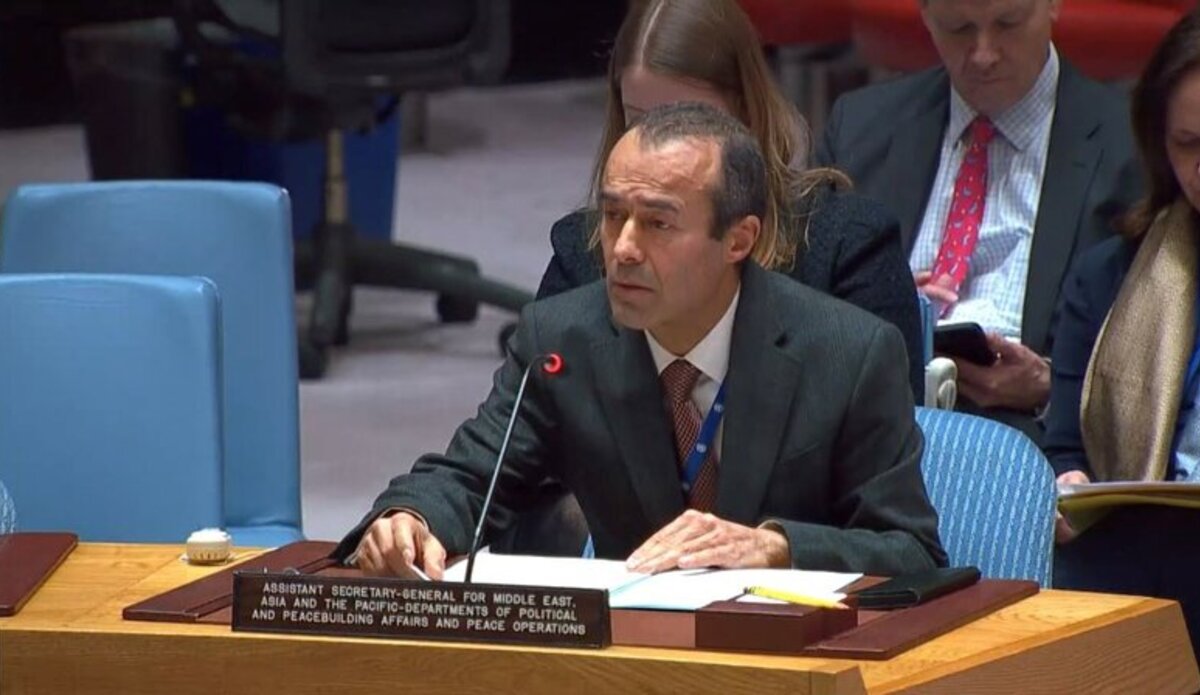ASSISTANT SECRETARY-GENERAL KHALED KHIARI’S
REMARKS TO THE SECURITY COUNCIL ON
NON-PROLIFERATION/DPRK
New York, 20 February 2023
Madam President,
According to its official news agency, the Democratic People’s Republic of Korea (DPRK) conducted what it described as an “intercontinental ballistic missile” launching drill on 18 February.
The DPRK announced that the ballistic missile – which it designated as “Hwasong-15” - flew a distance of 989 km and to an altitude of 5,768.5 km. It impacted in the sea within Japan’s exclusive economic zone. The last time the DPRK conducted a test of a missile of intercontinental range was on 18 November 2022.
Earlier today, the DPRK conducted what it termed a launching drill involving two quote “tactical nuclear” end quote - rockets.
The DPRK again did not issue airspace or maritime safety notifications. Unannounced launches represent a serious risk to international civil aviation and maritime traffic.
Madam President,
The Secretary-General strongly condemns the launch of yet another ballistic missile of intercontinental range by the DPRK, as well as its subsequent launches using ballistic missile technology.
The Secretary-General reiterates his calls on the DPRK to immediately desist from taking any further provocative actions, to fully comply with its international obligations under all relevant Security Council resolutions, and to resume dialogue leading to sustainable peace and the complete and verifiable denuclearization of the Korean Peninsula.
Madam President,
As per our earlier briefings to this Council, the DPRK continues to implement its five-year military plan unveiled during the 8th Party Congress in January 2021. That plan provided for development of new solid propellant intercontinental-range ballistic missiles; multiple warheads; better warheads; tactical nuclear weapons; a military reconnaissance satellite; new unmanned aerial systems; a 15,000 km-range intercontinental ballistic missile; and a “hypersonic gliding flight warhead”.
The DPRK has repeatedly warned of so-called “counteractions” to military exercises carried out in the region. The DPRK Foreign Ministry described the Security Council meeting of 16 February on non-proliferation and the DPRK as a quote “hostile act that the DPRK is bound to take due counteraction” end quote. Today’s meeting reaffirms that the Security Council has primary responsibility for the maintenance of international peace and security. The meeting also provides an opportunity to discuss practical measures for achieving a peaceful, comprehensive, diplomatic, and political solution to the situation on the Korean Peninsula.
Madam President,
The DPRK greatly increased its missile launch activities in 2022, including approximately 70 launches using ballistic missile technology. The DPRK characterised these launches as involving systems with nuclear weapon roles, including so-called “tactical” nuclear weapons. Most of the systems it tested are capable of striking targets on the Korean Peninsula. It also tested systems capable of reaching parts of North America on two occasions last year and again on 18 February.
In September 2022, the DPRK approved a new law which set out conditions in which it could use nuclear weapons, including pre-emptively in certain circumstances. A seventh nuclear test would be a flagrant violation of Security Council resolutions and undermine the international norm against nuclear testing. The Secretary-General remains firmly committed to achieving the goal of a world free of nuclear weapons.
Madam President,
Looking ahead, the DPRK has clearly stated its intention to continue to pursue its nuclear weapons and ballistic missile programmes in violation of the relevant Security Council resolutions.
During the Sixth Plenary Meeting of the Eighth Central Committee of the Workers’ Party of Korea, held from 26 to 31 December 2022, the DPRK reiterated that it would: (i) exponentially increase its nuclear weapons arsenal; (ii) develop another intercontinental ballistic missile system; as well as (iii) launch its first military satellite.
During the military parade to commemorate the 75th founding anniversary of the Korean People's Army on 8 February, the DPRK unveiled a new apparent solid-fuelled intercontinental ballistic missile, and at least 11 intercontinental ballistic missiles of previously known type Hwasong-17.
Madam President,
The situation on the Korean Peninsula continues to head in the wrong direction. Tensions continue to increase, due to the negative action-reaction cycle, with no off-ramps in sight.
The Secretary-General deeply regrets the divisions that have prevented the international community from acting on the DPRK, as well as on other threats to peace and security around the world. The Korean Peninsula must be an area for cooperation.
Madam President,
As previously stated, as the Council considers its options, there are several practical steps that could reduce tensions.
First, the DPRK needs to take immediate steps to resume dialogue leading to sustainable peace and the complete and verifiable denuclearization of the Korean Peninsula. This should include the DPRK refraining from carrying out further launches using ballistic missile technology or nuclear tests.
Second, a comprehensive approach is needed. We welcome the Security Council’s commitment to a peaceful, comprehensive, diplomatic, and political solution to the situation on the Korean Peninsula, as well as the importance the Council has placed on working to reduce tensions. Diplomacy – not isolation - is the only way forward.
Third, it is critical to avoid an unintended escalation. Communication channels must be enhanced, particularly military to military. Avoiding confrontational rhetoric will help to lower political tensions and create space to explore diplomatic avenues.
Madam President,
Separately, I wish to highlight once more our concerns regarding the humanitarian situation in the DPRK. The United Nations is ready to assist the DPRK in addressing medical and other humanitarian needs. To allow for a timely and effective response, we reiterate our call for the unimpeded entry of international staff, including the Resident Coordinator, and humanitarian supplies.
Madam President,
Let me close by reiterating that the unity of the Security Council on the DPRK is essential to ease tensions and overcome the diplomatic impasse. As the Secretary-General has said, while primary responsibility for international peace and security rests with this Council, the Secretariat is your partner in this effort.
Thank you, Madam President.

